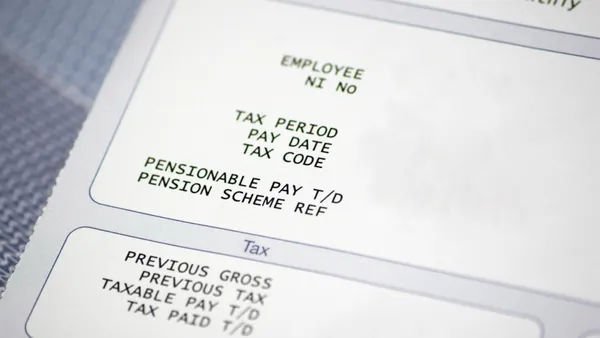In today’s tough talent market, employers are going back to basics — and looking to tech to not only improve on those basics, but futureproof the company against the incoming automation flux.
From legacy platforms to microchip technology, the HR tech market has continued its swift expansion. Focus, however, remains largely on improving data management in order to improve employee experience and business processes. Many of our top tech stories from the year involve companies seeking to streamline current business processes and simplify the tech already on hand.
To see what stories defined tech advancement in HR this year, read on.
AI and automation
Headlines shifted back and forth this year on whether AI and automation would be boon or bane to employees of all types, including HR managers.
Confusion reigns on which jobs automation will make obsolete, but current overall consensus is that automation will free up HR to perform more business-oriented, strategic tasks. A good thing, since HR will be busy preparing the rest of the workforce for the coming automation wave.
Few companies, if any, know exactly what kind of jobs they will need to prepare their workers for, and perhaps haven't taken the time to explain what automation is and how it could affect workers' jobs in the future. The time to do that is now.
Chatbots, a more consumer-oriented form of AI, also reared their head, but adoption has somewhat stalled for that technology.
-
Chatbots, aiming to improve productivity, still in learning stages
Chatbots can streamline work and save money, experts say, but many are still creating more errors than assistance. Read More >>
-
Automation can free up HR, but where do you draw the line?
Though HR professionals are glad to hand over time-consuming tasks to bots, true efficiency requires a human touch. Read More >>
-
AI is coming for more jobs, but not all of them and not all at once
As automation claims more jobs over time, employers must be ready to upskill workers for new roles. Read More >>
-
50% of HR leaders foresee cognitive technology's impact, says IBM
Meanwhile, 65% of CEOs say they envision that cognitive tech will drive significant value to their HR departments. Read More >>
-
SAP targets biased job ads with new machine learning solution
The company's Leonardo platform will soon allow recruiters to target phrases and language that might be construed as favoring one gender over another. Read More >>
-
Most Impactful Tech of the Year: Big Data analytics
What is the value of an employee? Big Data analytics hopes to answer that question. Read More >>
-
Microsoft plans to gain bigger share of the HR market with Dynamics 365
Because of Microsoft's acquisition of LinkedIn, the tech giant gains access to a massive membership roll which could lead to more sales opportunities for end-user products. Read More >>
-
Microsoft wades further into employer productivity data with Workplace Analytics
The announcement once again shows that HR leaders who aren't using people analytics could be behind the times. Read More >>
-
Google dives deeper into recruiting tech with Hire
Google's interest in recruitment points to the profit potential of the industry, especially as talent shortages press companies of all types to change up their tactics. Read More >>
-
Walmart to adopt Workplace, Facebook's business chat solution
The move could mean 2.2 million new users for Facebook's platform — a huge boost to the social media giant's efforts to compete in a crowding market. Read More >>
-
Facebook's Workplace moves to desktop apps with screen sharing
As Facebook nears the one-year anniversary of Workplace, it has responded to customer demands for new features on the communication platform with a beta launch. Read More >>
-
Google for Jobs will show job listings' salary info
The company says it will pull info from Glassdoor and others to show potential applicants what jobs listed on the site might pay. Read More >>
-
Google for Jobs could disrupt recruiting, but how should you use it?
A new report from kununu sheds some light on how employers can best take advantage of the platform. Read More >>
-
Zenefits gets out of the brokerage business, opts to collaborate instead
The HR tech company wants to become a "backbone" platform for HR solutions, reflecting current transformations in the tech space. Read More >>
-
Wellness program wearables could lead to denied coverage for some workers
Take the case of the Fitbit-UnitedHealthcare workplace partnership, which allows data gathered from employees' activity trackers to be shared with insurers. Read More >>
-
Study: 35% of employers use wearables in wellness programs
Use of wearables increased 10% from 2015, and the number is likely going to keep growing. Read More >>
-
Manufacturer: Glass wearables reduced new employee training time by 50%
The tech reveals yet another way blue-collar industries like manufacturing could be transformed by emerging innovation. Read More >>
-
Microchip implants make data accessible but raise workplace privacy questions
The RFID microchip implant is designed to take the place of keys, business cards and other items. Will it catch on? Read More >>
-
Big Brother comes to Barclays: Sensors track employees' desk time
The employer says the desk sensors were a cost-saving measure aimed at eliminating less-occupied office areas. Read More >>
Machine learning and data analytics
Our HR Dive Awards most impactful tech of the year was Big Data analytics — partly driven by the growing interest in simplifying data analysis.
Data analysis can go a long way in helping solve pernicious HR problems, including addressing unconscious bias in recruiting, improving personalization and managing vast amounts of unstructured data. And big-name tech companies have a keen interest in creating tools to make that process easier.
Microsoft, Facebook and Google go further into HR enterprise market
As the HR tech market expanded this year, some big-name players moved into HR professionals’ lives through the tools many of them already use: namely, email and calendar.
At the beginning of the year, Microsoft announced it was expanding its Dynamics brand (famed now for its bundled Office programs) to include more HR apps — data management in particular. A few months later, the company announced Workplace Analytics for executive use, a tool that allows managers to track worker productivity through email and calendar use. Google dove in, as well, synchronizing its G-suite of apps with Google Hire (though you can read about and even bigger announcement from them below).
Facebook also has courted business attention with its Workplace platform, hoping to woo managers already familiar with its base product. The social media company snagged a major win this year when Walmart announced they were adopting Workplace as their platform of choice. Expect more developments in this arena next year, as big players seek to acquire smaller, successful apps to build out their programming.
Google for Jobs
When Google for Jobs was announced, industry watchers immediately began speculating whether it would collapse job boards as we know them. But notably, CareerBuilder, LinkedIn, Monster, WayUp, DirectEmployers, Glassdoor and Facebook — all fairly big names in the recruitment space — collaborated with Google to help create the new search function.
Instead, Google for Jobs may encourage employers to craft better job ads that more accurately dictate the nature of open positions. Creating more structured data in your postings can make them eligible to appear in a special user experience in Google search results, earn more prominent placement in search results and net more motivated applicants.
Zenefits goes platform
Beyond just being the next step in its comeback story, Zenefits’ pivot into a full-on tech company reflects trends seizing the rest of the benefits tech market.
As the market reaches saturation, the bigger tech players are seeking to partner with or acquire smaller, more specialized companies. Zenefits seeks to set itself up as the "backbone" other HR tech companies can partner with and integrate alongside, as many do with Salesforce for other business applications.
While the company didn’t completely abandon brokerages, the company has learned over the past few years that they "don't have to do it all."
Wearables
When you think of wearables, wellness may come to mind first, thanks to the proliferation of Fitbit, Garmin and Samsung fitness devices. Such devices are increasingly being used in employer healthcare plans to engage employees. But they also received intense scrutiny this year, with some worried that, if the Affordable Care Act were to be repealed, employers would eventually be able to use wearable data to deny healthcare coverage entirely.
But wearables also are finding their place in training programs and employee acclimation. In a manufacturing workplace, the ability to be both efficient and detail-oriented in assembly work is critical to success. Training employees from day one using such assistance tools can be a good way to get them accustomed to the future of work.
Wearables will eventually enable better augmented-reality programs, and may help bring virtual reality to more mainstream use.
Microchip implants and employee tracking
Is Big Brother coming to your workplace? Depends on who you ask.
A Swedish tech firm announced the creation of a microchip implant for employees that could replace keys, access cards and other devices employees need to get around a typical office. Naturally, the somewhat invasive nature of the implant created privacy concerns (though the creator claims more danger is posed by mobile phones and Internet searches).
Some offices, of course, already use a variety of employee tracking technologies. Employees at Barclays realized that sensors had been installed on their desks to track work time and productivity — a controversial move in the banking industry overall.














